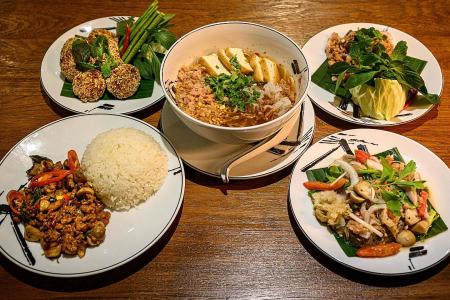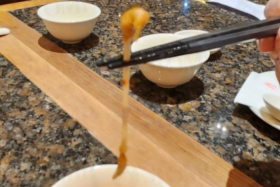Alt-protein inches into South-east Asian menus
BANGKOK : A sprinkle of chilli, some pinkish "pork" and a few basil leaves tossed into a sizzling wok - chef Songpol swears his vegan version of punchy Thai favourite pad kra pao is a match for the original, as plant-based protein creeps into South-east Asia's meat-heavy menus.
"It has the texture, the flavour (of pork). The rest is about technique," he said in the bustling kitchen at You & Mee restaurant in Bangkok, which also serves vegetarian versions of various Thai dishes.
But he concedes some diners remain to be convinced of the merits of fiddling with old recipes in a country ferociously proud of its cuisine.
"They do not expect plant-based items to be cooked with Thai dishes," he added.
Global food producers are racing to dominate the alt-protein sector, an industry Barclays bank estimates could be worth US$140 billion (S$192 billion) in a decade, as environmental, ethical and health concerns drive a plant-based boom.
But while the trend nibbles at the gargantuan meat industry in the US, alt-protein protagonists are also eyeing new frontiers, including in Asia where millions are nourished on meat and fish-heavy diets.
Pork in particular is ever-present in rice dishes and noodle bowls across the region.
Chef Songpol's pad kra pao is made with new brand Omnimeat, a pork imitation of peas, shiitake mushrooms, rice and soy from Hong Kong-based firm Green Monday.
"It is designed with Asian food in mind," said chief executive officer David Yeung.
After Singapore - where the brand launched in restaurants late last year - Buddhist-majority Thailand has become a major South-east Asian test bed for the mock pork.
But changing Asian palates and culinary habits is "extremely difficult," concedes Mr Yeung.
The pad kra pao at You & Mee costs about US$8, four times more than a diner might pay on a Bangkok street.
Critics also say that many new plant-based products are processed and not as healthy as advertised, so the jury is still out on whether South-east Asians will convert from meat. - AFP
Get The New Paper on your phone with the free TNP app. Download from the Apple App Store or Google Play Store now



